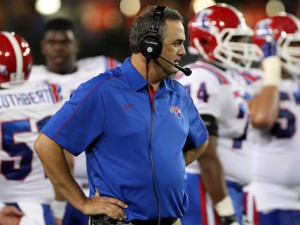
La. Tech head coach Sonny Dykes should be a hot commodity this offseason. (Troy Taormina-US PRESSWIRE)
The most successful non-BCS-conference coaches who are not fixtures at their respective schools mostly come from the WAC, Sun Belt and Mid-American conferences.
Fixtures include Nevada coach Chris Ault and Ohio coach Frank Solich, whose teams are off to impressive starts. They are not going anywhere, however, because of their age and the legacies they have built at their schools.
Texas-San Antonio’s Larry Coker, another veteran coach, is listed here among the top 10 coaches at non-BCS schools because he is not a fixture yet. The Roadrunners are only in their second year of existence.
The state of Louisiana has three of the best coaching prospects – Louisiana Tech’s Sonny Dykes, Louisiana-Monroe’s Todd Berry and Louisiana’s Mark Hudspeth. The best among all of them is Dykes, who has a family history of coaching, an impressive resume and the ability to build a program.
Here’s a look at the coaches who might be coaching at the BCS level soon, likely next season for the top three:
1. Louisiana Tech coach Sonny Dykes
Why he’s a good candidate: The Bulldogs are 5-0 in Dykes’ third season as head coach with two of the victories on the road against teams from BCS conferences – Illinois and Virginia. Dykes has the pedigree to be a successful coach. His father, Spike Dykes, has the most coaching victories in Texas Tech history. The younger Dykes also has a history of coaching under head coaches who have proven backgrounds on both sides of the ball. He was the offensive coordinator at Arizona, which was coached by Mike Stoops, Oklahoma’s defensive coordinator before moving to Tucson (he has returned to Norman in the same capacity). He was also receivers coach and later co-offensive coordinator with Dana Holgorsen at Texas Tech under spread passing guru Mike Leach.
Why he’s not a good candidate: No need to waste time with this one. Barring an unforeseen collapse by Louisiana Tech in the second half of the WAC season, Dykes will be a head coach at the BCS level this time next year.
2. San Jose State coach Mike MacIntyre
Why he’s a good candidate: MacIntyre’s coaching background in the NFL is significant and he is proving himself to be a program rebuilder. He served as the defensive backs coach with the Dallas Cowboys and New York Jets from 2003-2007. He also comes from a coaching pedigree. His father, George MacIntyre, improved struggling football programs at Tennessee-Martin and Vanderbilt as head coach. San Jose State went 1-12 in his first season in 2010, with the Spartans operating with about 15 fewer scholarships because of inadequate Academic Progress Rate scores. The Spartans opened 2011 with a full 85 scholarships and they started to improve. They snapped a 13-game losing streak, the longest in the FBS, and finished 5-7. MacIntyre has San Jose State off to an impressive 4-1 start, with the only loss being a hard-fought setback at Bay-area rival Stanford 20-17 to open the season.
Why he’s not a good candidate: This is a difficult argument, other than MacIntyre is only his second year as a head coach. But MacIntyre, 47, is young enough to build a struggling BCS program into a success and stay there for a long time.
3. Western Kentucky coach Willie Taggart
Why he’s a good candidate: If Jim Harbaugh is in your corner, you know you are doing something right as a young coach. Taggart has coached Western Kentucky to a 4-1 start in his third season at his alma mater after coaching running backs, including Heisman candidate Toby Gerhart, under Harbaugh at Stanford from 2007-2009. Harbaugh pushed for Taggart to take part in the NFL’s minority internship program. He also served an internship with the Eagles and became knowledgeable of the West Coast offense. Greg Roman, now with Harbaugh as the 49ers offensive coordinator, said earlier this season in a press conference that he learned about read-option schemes from Taggart during their time on the Stanford staff.
Why he’s not a good candidate: School allegiance because he is a former Western Kentucky player? Nah. Taggart, 35, looks to be as good as they come. He is too good even to take the Kentucky job in the SEC. He can do better.
4. Northern Illinois coach Dave Doeren
Why he’s a good candidate: Doeren, 40, has experience as a coordinator at the BCS level, serving as Wisconsin’s defensive coordinator from 2006-2010. This is an athletic director’s dream: The Huskies’ Academic Progress Rate (APR), the NCAA’s primary academic measurement tool, ranks in the top five in the country. As an assistant coach at Drake, USC, Montana, Kansas and Wisconsin, he helped take teams to eight bowl games and two national championship games. Northern Illinois is off to a 5-1 start after finishing 11-3 in Doeren’s first season last year.
Why he’s not a good candidate: Northern Illinois’ best win under Doeren through 20 games was against Ohio last year in the MAC championship. That means the Huskies have not upended a BCS team, although they came close in an 18-17 loss against Iowa in Chicago to start the season. The Huskies blew a 17-9 lead in the fourth quarter.
5. Toledo coach Matt Campbell
Why he’s a good candidate: Campbell, 32, is the youngest coach at the FBS level in his first season as a head coach. That means an athletic director for a BCS program could count on the very promising coaching and recruiting skills of Campbell to be around for a long time. It is not unprecedented for a young coach to use Toledo as a springboard for bigger and better opportunities. Nick Saban left Toledo after only one season (1990) to be an assistant with the Cleveland Browns under Bill Belichick. Toledo was Saban’s first head coaching job and he was only 38 when he took the position. Campbell, Toledo’s offensive coordinator for three years under Tim Beckman (now at Illinois), also coached at Bowling Green as an assistant. He has coached the Rockets to a 5-1 start, with their only loss at Arizona in overtime.
Why he’s not a good candidate: An athletic director at a BCS school may want to give Campbell a couple of more years to see how his recruits and system take hold at Toledo. His young age could be a factor in that regard. Also, the effectiveness of Toledo’s defense could be a concern. The Rockets rank No. 116 out of 120 FBS teams in pass defense (310 yards per game) and 99th in total defense (451.8 yards a game allowed).
6. Louisiana coach Mark Hudspeth
Why he’s a good candidate: Before Hudspeth was hired by the Ragin’ Cajuns last season, their program had only one winning season in the previous 15 years. Hudspeth, who built North Alabama into a Division II power from 2002-2008, coached Louisiana to a 9-4 season in his first year. The Ragin’ Cajuns beat San Diego State 32-30 in the New Orleans Bowl, the school’s first bowl in 41 years. Hudspeth, 43, was exposed to SEC football in 2009 and 2010 as the wide receivers coach at Mississippi State under Dan Mullen. He has Louisiana-Lafayette off to a 4-1 start.
Why he’s not a good candidate: Louisiana lost big at Oklahoma State 65-24 in its only significant test this season. The Ragin’ Cajuns also lost big at the Cowboys last season and they were defeated on the road by a 4-8 Arizona team with an interim coach to conclude the regular season. Louisiana also ranks No. 58 in total offense and No. 73 in total offense, not overwhelming marks. Hudspeth may need a couple more years of success to establish himself for a BCS position.
7. Louisiana-Monroe coach Todd Berry
Why he’s a good candidate: Berry, who has coached at the major-college level before at Army, led the Warhawks to an overtime victory at Arkansas this year and a near upset of Auburn before losing in overtime. They also barely lost to Baylor 47-42 and defeated Middle Tennessee 31-17 on the road, a week after Middle Tennessee beat Georgia Tech 49-28. Despite playing against two SEC teams and one from the Big 12, Louisiana-Monroe remains one of the best offenses statistically in the nation. The Warhawks ranked 13th in total offense averaging 514.6 yards a game. Berry served as the offensive coordinator at UNLV for three seasons before his hire at Louisiana-Monroe. While with the Rebels, he coached under Mike Sanford, who comes from the Urban Meyer coaching tree.
Why he’s not a good candidate: His four years at Army from 2000-2003 were miserable. He was fired after Army started 0-6 in 2003. His record with the Black Knights: 5-35. Berry, 51, is at the age when an opportunity can’t wait too much longer, but does an AD jump this fast at Berry, only in his second year at Louisiana-Monroe? He likely must prove himself another couple of years with the Warhawks.
8. Kent State coach Darrell Hazell
Why he’s a good candidate: Hazell, in his second year with the Golden Flashes, has Kent State (4-1) off to its best start since 1977. Before moving to Kent State, where he became the program’s first minority hire, Hazell, 48, built his resume impressively. He spent seven seasons as an assistant under former Ohio State coach Jim Tressel. Hazell was the associate head coach with the Buckeyes for the last six seasons before Kent State hired him. He was the associate head coach at Rutgers in 2003. He has also coached at West Virginia, Army and Western Michigan.
Why he’s not a good candidate: The Golden Flashes’ lone defeat this season is to Kentucky, which is struggling under embattled coach Joker Phillips. The game was a rout, with the Wildcats winning 47-14 at home. That kind of performance can make an athletic director think Hazell is not ready to lead a major-college program just yet.
9. Tulsa coach Bill Blankenship
Why he’s a good candidate: Blankenship, an offensive-minded coach, has won wherever he’s coached, which is mostly at the high school level in his native Oklahoma. He compiled a 154-26 record at Union High School in Tulsa for 14 years before he returned to his alma mater Tulsa to become the wide receivers coach in 2010. Blankenship was hired as the head coach before the following season after Todd Graham took the Pittsburgh job. The Golden Hurricane finished 8-5 overall and 7-1 in Conference USA in his first season. Tulsa is off to a 5-1 start this season, ranking 12th nationally by averaging 42.5 points a game. More impressive is Tulsa’s defense, which leads the nation in sacks (4.5 a game) and tackles for loss (9.83 per game).
Why he’s not a good candidate: Blankenship is 55 years old, which means he might be inclined to finish his career at Tulsa, where he played quarterback from 1977-79. He has also only coached in the state of Oklahoma.
10. Texas-San Antonio coach Larry Coker
Why he’s a good candidate: The only scenario in which Coker, 64, could work again at the BCS level is if he brings along an offensive or defensive coordinator that is major-college coaching material. Coker would be there to groom the younger coach for the top spot. Coker has the 2001 national title as Miami’s coach to his credit. He was also given the Paul “Bear” Bryant Award for the nation’s top coach that season. Texas-San Antonio is 5-0 under Coker in its second year of existence.
Why he’s not a good candidate: Coker’s age is a significant reason, and he is also determined to get the UTSA program off the ground. The Roadrunners will move from the WAC to Conference USA next season. Also, Coker’s decline and ultimate firing at Miami makes it seem as if his days at the major-college level are behind him.

